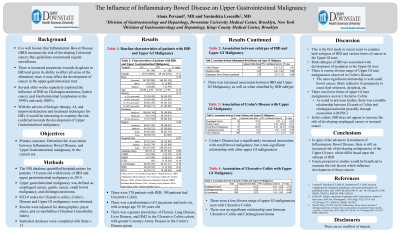Back


Poster Session E - Tuesday Afternoon
Category: IBD
E0353 - The Influence of Inflammatory Bowel Disease on Upper Gastrointestinal Malignancy
Tuesday, October 25, 2022
3:00 PM – 5:00 PM ET
Location: Crown Ballroom

Has Audio
- AP
Alana Persaud, MD
SUNY Downstate
Brooklyn, New York
Presenting Author(s)
Alana Persaud, MD1, Yaniuska Lescaille, MD2, Catherine Choi, MD3
1SUNY Downstate, Brooklyn, NY; 2Kings County Medical Center, Brooklyn, NY; 3Rutgers New Jersey Medical School, Newark, NJ
Introduction: It is well known that Inflammatory Bowel Disease (IBD) increases the risk of developing Colorectal cancer. However, older works from the 1990’s examined how Ulcerative Colitis and Crohn’s Disease separately influence gastric and small bowel cancers as well. The aim of this nationwide investigation is to explore the current relationship between upper gastrointestinal malignancies and both Crohn’s Disease and Ulcerative Colitis.
Methods: The National Inpatient Sample was queried for patients with a primary diagnosis of upper gastrointestinal malignancy and a secondary diagnosis of either Ulcerative Colitis or Crohn’s Disease in 2014. Upper gastrointestinal malignancies were defined as esophageal cancer, gastric cancer, small bowel malignancy, or cholangiocarcinoma. The primary outcome is the relationship between Ulcerative Colitis, Crohn’s Disease, and various forms of upper gastrointestinal cancer. Multivariate logistic regression was conducted using Stata v.13.
Results: In 2014, there were 175 patients with IBD, 105 of which had Crohn’s Disease. Regression analyses demonstrated an increased association with upper gastrointestinal malignancies in both Crohn’s Disease (aOR 2.08, p< 0.00) and Ulcerative Colitis (aOR 1.91, p=0.05). When stratified, there was a greater association between cholangiocarcinoma and Ulcerative Colitis (aOR 4.30, p< 0.00), as compared to Crohn’s Disease (aOR 2.14, p=0.04). However, there was a strong relationship between small bowel cancer and Crohn’s disease (aOR 11.88, p< 0.00), but no significant association with Ulcerative Colitis. With regard to esophageal and gastric malignancies, no significant relationship with either form of IBD was established.
Discussion: There have been limited studies evaluating the relationship between upper gastrointestinal malignancies and either Crohn’s Disease or Ulcerative Colitis. This study demonstrated that both conditions have an increased association with development of cholangiocarcinoma. Ulcerative Colitis poses a two-fold greater risk, likely due to its relationship with Primary Sclerosing Cholangitis. Moreover, Crohn’s Disease offers a nearly six-fold increased risk of developing small bowel malignancy. Given its propensity to cause ileitis and intestinal strictures, dysplasia and cancer are worrisome possibilities. This is the first study in recent years to highlight the ability of both forms of IBD to influence development of extracolonic malignancies, which can be used to improve clinical evaluation in this population.
Disclosures:
Alana Persaud, MD1, Yaniuska Lescaille, MD2, Catherine Choi, MD3. E0353 - The Influence of Inflammatory Bowel Disease on Upper Gastrointestinal Malignancy, ACG 2022 Annual Scientific Meeting Abstracts. Charlotte, NC: American College of Gastroenterology.
1SUNY Downstate, Brooklyn, NY; 2Kings County Medical Center, Brooklyn, NY; 3Rutgers New Jersey Medical School, Newark, NJ
Introduction: It is well known that Inflammatory Bowel Disease (IBD) increases the risk of developing Colorectal cancer. However, older works from the 1990’s examined how Ulcerative Colitis and Crohn’s Disease separately influence gastric and small bowel cancers as well. The aim of this nationwide investigation is to explore the current relationship between upper gastrointestinal malignancies and both Crohn’s Disease and Ulcerative Colitis.
Methods: The National Inpatient Sample was queried for patients with a primary diagnosis of upper gastrointestinal malignancy and a secondary diagnosis of either Ulcerative Colitis or Crohn’s Disease in 2014. Upper gastrointestinal malignancies were defined as esophageal cancer, gastric cancer, small bowel malignancy, or cholangiocarcinoma. The primary outcome is the relationship between Ulcerative Colitis, Crohn’s Disease, and various forms of upper gastrointestinal cancer. Multivariate logistic regression was conducted using Stata v.13.
Results: In 2014, there were 175 patients with IBD, 105 of which had Crohn’s Disease. Regression analyses demonstrated an increased association with upper gastrointestinal malignancies in both Crohn’s Disease (aOR 2.08, p< 0.00) and Ulcerative Colitis (aOR 1.91, p=0.05). When stratified, there was a greater association between cholangiocarcinoma and Ulcerative Colitis (aOR 4.30, p< 0.00), as compared to Crohn’s Disease (aOR 2.14, p=0.04). However, there was a strong relationship between small bowel cancer and Crohn’s disease (aOR 11.88, p< 0.00), but no significant association with Ulcerative Colitis. With regard to esophageal and gastric malignancies, no significant relationship with either form of IBD was established.
Discussion: There have been limited studies evaluating the relationship between upper gastrointestinal malignancies and either Crohn’s Disease or Ulcerative Colitis. This study demonstrated that both conditions have an increased association with development of cholangiocarcinoma. Ulcerative Colitis poses a two-fold greater risk, likely due to its relationship with Primary Sclerosing Cholangitis. Moreover, Crohn’s Disease offers a nearly six-fold increased risk of developing small bowel malignancy. Given its propensity to cause ileitis and intestinal strictures, dysplasia and cancer are worrisome possibilities. This is the first study in recent years to highlight the ability of both forms of IBD to influence development of extracolonic malignancies, which can be used to improve clinical evaluation in this population.
Disclosures:
Alana Persaud indicated no relevant financial relationships.
Yaniuska Lescaille indicated no relevant financial relationships.
Catherine Choi indicated no relevant financial relationships.
Alana Persaud, MD1, Yaniuska Lescaille, MD2, Catherine Choi, MD3. E0353 - The Influence of Inflammatory Bowel Disease on Upper Gastrointestinal Malignancy, ACG 2022 Annual Scientific Meeting Abstracts. Charlotte, NC: American College of Gastroenterology.

